As you've landed on this Teachable alternatives roundup, there's a good chance there's an area of expertise you're particularly passionate about. If you're nodding as you read, you'll be pleased to hear you can easily harness your industry know-how to generate a healthy income.
All you need is an online platform where you can create and market your own online course.
Traditionally, this is where Teachable came into its own. However, with the growth of digital learning, there are now tons of viable Teachable alternatives to consider – and we're going to explore seven of them here in this review.
Let's dive in!
Teachable Alternatives Comparison Table (2025)
| Platform | Starting Price (USD) | AI Features (2025) | Best For | Key Strengths |
|---|---|---|---|---|
| Thinkific | Free / $49/month | AI course outline generator, learner engagement insights | Custom course creators | Strong free plan, no coding required |
| Podia | $39/month | AI sales copy for landing pages and emails | Beginners & digital sellers | No transaction fees, simple setup |
| Udemy | Free to publish | AI quality checks for video and structure | Wide audience reach | Built-in traffic, SEO visibility |
| Teachery | $49/month | Supports embedded AI tools via HTML | Creators who value simplicity | Unlimited courses, clean layout |
| Academy of Mine | $499/month | AI analytics dashboard, predictive learner insights | B2B, compliance, corporate training | SCORM/xAPI support, deep customization |
| Kajabi | $119/month | AI Creator Hub for writing emails, pages, social posts | All-in-one business builders | Funnels, automations, CRM, emails |
| Ruzuku | $74.75/month | Integrates AI transcription tools (Descript, Otter) | Coaches & live educators | Webinars, polls, student forums |
| Skillshare | Free to join | AI used for content moderation & tagging internally | Creative teachers building reach | Subscription-based income, large user base |
| LearnDash | $199/year | Supports AI via WordPress integrations (e.g., GPT plugins) | WordPress-based course sites | Deep control, scalable for developers |
| Systeme.io | Free / $27/month | AI writing assistant for funnels and emails | Budget-conscious entrepreneurs | All-in-one (funnels, email, courses) |
| Mighty Networks | $39/month | AI moderation tools and future AI topic suggestion tools | Community-focused creators | Combines courses + community + mobile app |
| Graphy | $49/month | AI-driven mobile optimization and engagement analytics | Mobile-first creators, especially in Asia | App + site in one, global payments, white-labeling |
1. Thinkific

Thinkific is a Canadian-based company. Their all-in-one solution's fantastic for entrepreneurs wanting to create and launch beautiful online courses.
Thinkific is a user-friendly course platform designed for creators who want to build, market, and sell online courses without writing code. It's well-suited for coaches, consultants, and educators looking for full control over the student experience.
In 2025, Thinkific has introduced AI-powered course templates and outline generation tools, which help speed up course planning and lesson design. The platform now also offers AI-based insights into learner engagement to help identify where students drop off.
Pricing:
- Free plan: 3 courses, unlimited students
- Basic: $49/month
- Pro: $99/month
- Premier: $499/month
Pros
- AI course outline generator for faster content planning
- Offers a generous free plan with up to three courses
- Instant payouts with no waiting period
- Robust integrations with Zapier, ConvertKit, and email platforms
- Strong customization options for branding and design
Cons
- Limited video upload size and file type support
- Reporting tools are basic without third-party integrations
- No native quiz duplication or editing tools
- Forum lacks advanced features like search or moderation
- AI features are still early-stage and not deeply integrated
👉 Read our Thinkific review.
2. Podia
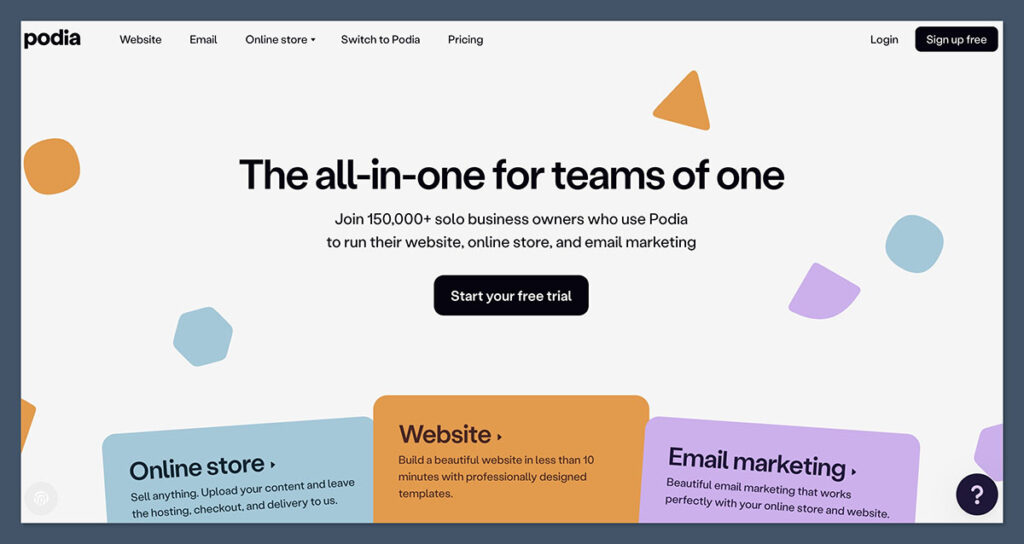
Podia is an all-in-one platform for selling courses, memberships, and digital products. It’s perfect for beginners or solopreneurs who want to get up and running quickly.
In 2025, Podia launched new AI writing tools to help with email campaigns, product descriptions, and sales pages.
Its clean interface, live chat support, and no transaction fees make it a favorite among creators who don’t want to deal with plugins or external systems. Podia also offers free migration for users switching from other platforms.
Pricing:
- Mover: $39/month
- Shaker: $79/month
- 14-day free trial included
Pros
- AI-powered sales copy tool for landing pages and emails
- Unlimited courses, students, and emails on paid plans
- 0% transaction fees on all plans
- User-friendly interface with no technical skills needed
- Own your customer data and brand identity
Cons
- Email marketing lacks advanced personalization
- No built-in analytics dashboard for performance tracking
- Editor has limited text formatting options
- Stripe-only payments limit global accessibility
- AI features are basic and not yet platform-wide
👉 Read our Podia review.
3. Udemy

Udemy gives you all the tools you need to launch a digital course. Not only do they provide a platform for course creation, but they also offer tons of tutorials on how to create online courses.
They even kit you with an ‘instructor dashboard' and ‘curriculum pages.' These handy resources help you to stay on track as you craft your digital product.
Udemy is one of the largest online course marketplaces, with a massive global audience of students. It’s free to publish courses, making it a good option for instructors focused on reach rather than control.
Instructors don’t handle the technical setup—Udemy provides the hosting, templates, and promotional tools.
Udemy rolled out AI course quality checks, offering real-time feedback on video structure, pacing, and audio clarity, helping instructors improve the student experience.
Pricing:
- Free for instructors
- Revenue split: 97% with coupon / 50% without
Pros
- Built-in audience of millions of potential students
- Free to publish and sell unlimited courses
- AI-assisted course quality checks for better content
- Strong SEO presence in Google search results
- Access to global instructor and support community
Cons
- Pricing and discounts controlled by Udemy
- No access to customer contact information
- Revenue share limits your earnings potential
- Heavy branding with limited personalization
- AI tools focus only on quality review, not content creation
👉 Read our Udemy review.
4. Teachery
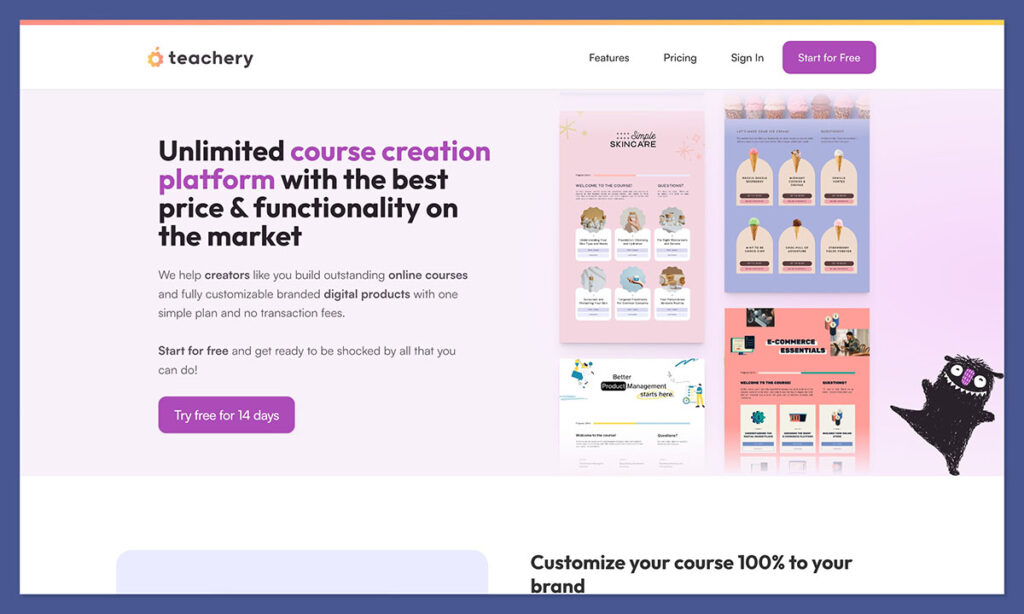
Teachery is excellent for entrepreneurs who want to get their course up and running as quickly as possible. It doesn't boast the same number of bells and whistles as their competitors – but they get the job done.
It's a straightforward solution, ideal for course developers who don't want to face tons of options and features to choose from.
Teachery offers a stripped-back course platform focused on simplicity and ease of use. It’s great for entrepreneurs who want to create and launch courses quickly, without dealing with complex features or design limitations. The platform doesn’t support native video or file hosting, but integrates with third-party tools. In 2025, Teachery added support for embedding AI-powered tools like chatbots and auto-generated lesson summaries via HTML, giving creators a low-code path to personalization.
Pricing:
- Monthly: $49/month
- Annual: $470/year
- 14-day free trial included
Pros
- Simple, distraction-free course creation experience
- Zero transaction fees, even on the lowest plan
- Unlimited courses, students, and pages
- Fast, responsive support from the founders
- Supports external AI tools through HTML embeds
Cons
- No native video or file hosting
- Cannot create quizzes or certificates
- Limited email marketing and CRM integrations
- Design options are basic without code
- No built-in AI features for content or marketing
👉 Read our Teachery review.
5. Academy of Mine
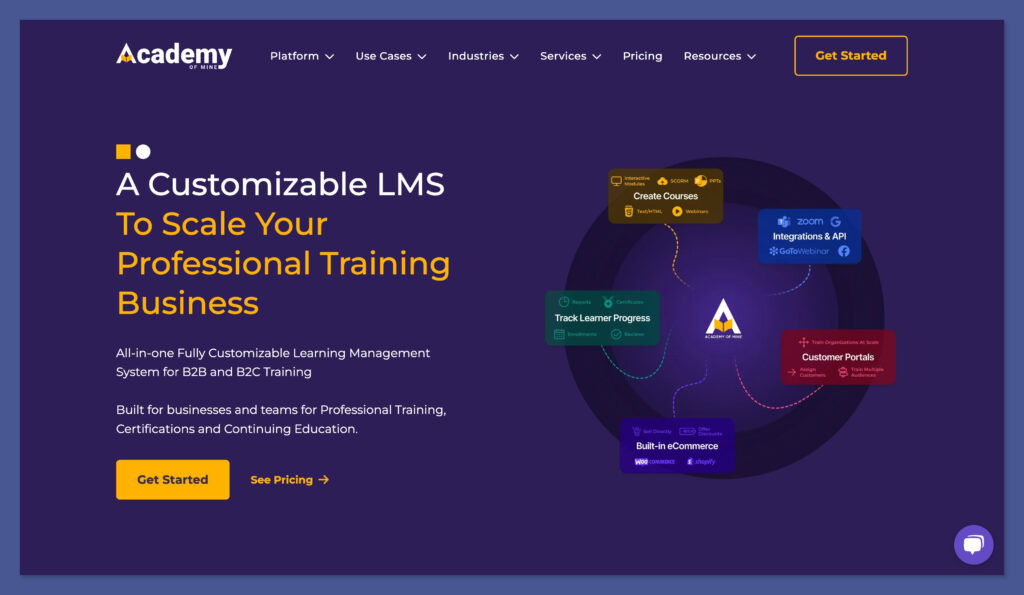
Academy of Mine is a holistic learning management platform, where entrepreneurs can craft, sell, and market their digital courses. It doesn't matter what size enterprise you're running; there's a good chance Academy of Mine has the tools you need to launch your venture.
Academy of Mine is a robust learning management system (LMS) built for professional education, continuing education providers, and corporate training. It offers full customization, SCORM/xAPI support, and a flexible setup for B2B clients.
In 2025, it introduced AI reporting dashboards that track learner behavior, predict course completion risk, and highlight content that may need improvement. The platform is feature-rich, but better suited for institutions and enterprise users than casual course creators.
Pricing:
- Essentials: $499/month
- Professional: $9,500/year
- Enterprise: Custom pricing
Pros
- Supports SCORM and xAPI for corporate training
- AI reporting tools highlight learner engagement trends
- Highly customizable for enterprise clients
- Includes student tracking, eCommerce, and certification
- No revenue share—fixed pricing model
Cons
- High monthly cost not suitable for solo creators
- Steeper learning curve for beginners
- Requires technical setup for advanced customization
- Limited AI tools beyond reporting and analytics
- Less suited for casual or creator-focused courses
6. Kajabi
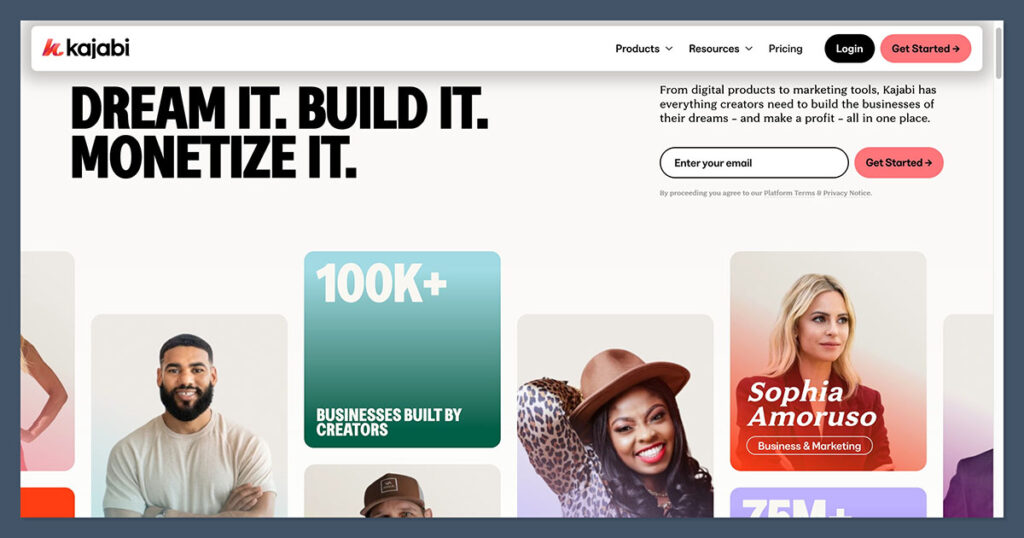
Kajabi is a comprehensive content marketing platform. They provide everything you could possibly need to launch and manage an online course. You can design and run landing pages, launch email marketing campaigns, edit your digital products, and much much more.
Kajabi is a premium all-in-one platform that combines online course hosting, email marketing, landing pages, and automation. It’s designed for serious digital entrepreneurs who want to run everything from one place.
Kajabi expanded its AI Creator Hub, allowing users to generate landing page copy, email sequences, and product descriptions with AI assistance. While Kajabi comes at a higher price, it replaces multiple tools, making it ideal for creators ready to scale.
Pricing:
- Basic: $119/month
- Growth: $159/month
- Pro: $319/month
Pros
- All-in-one platform for courses, email, and funnels
- AI Creator Hub writes emails and page copy automatically
- Automation tools for marketing and audience segmentation
- Strong integrations with third-party tools
- Regular updates based on user feedback
Cons
- High monthly pricing compared to competitors
- Limited affiliate and upsell customization
- Email marketing lacks some deeper analytics
- No built-in certificate creator for students
- AI features focus mostly on copywriting, not full content creation
👉 Read our Kajabi review.
7. Ruzuku
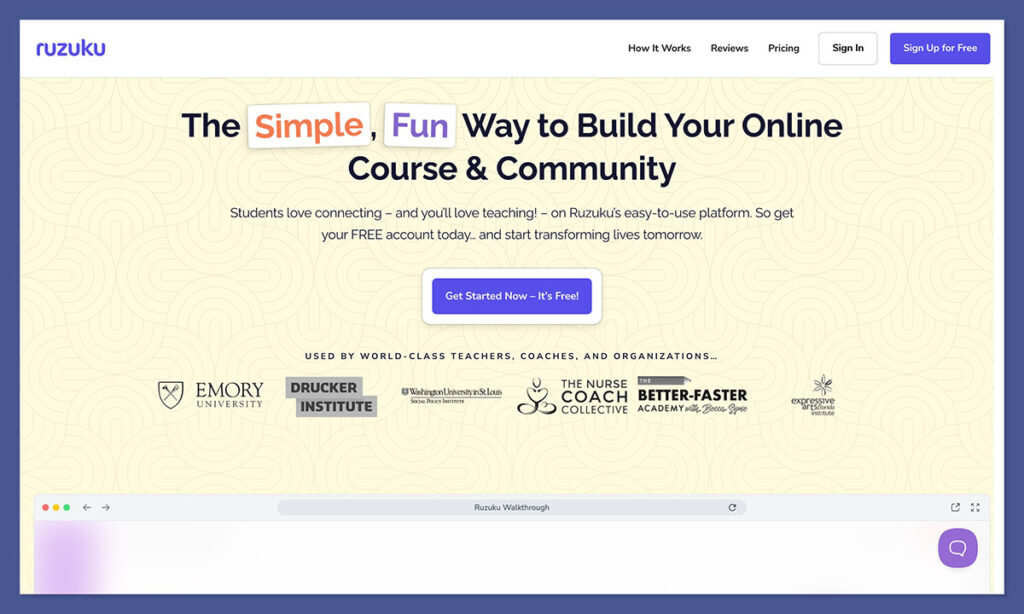
Ruzuku is best known for making it “ridiculously easy” for entrepreneurs to develop a course. So, if user-friendliness is a big deal for you, this could be the ideal solution.
Ruzuku allows you to create a course quickly, and develop the design of your online school as you gradually get to grips with Ruzuku's software.
Ruzuku is a beginner-friendly platform that focuses on simplicity and ease of course delivery. It’s known for live webinar support, built-in quizzes, and discussion forums.
Ruzuku added AI transcription tool integrations for turning videos and webinars into course notes or captions. It’s a good fit for creators who want to focus on teaching rather than managing complex tech setups. However, it lacks customization options for more advanced course websites.
Pricing:
- Bootstrapper: $74.75/month
- Up-and-Comer: $83.08/month
- University: $125/month
Pros
- Easy setup with unlimited course content hosting
- Includes built-in webinars, polls, and quizzes
- Supports live community interaction through forums
- Integrates with AI transcription tools like Descript
- Zero transaction fees on all plans
Cons
- Sales pages offer limited customization options
- No affiliate tools or advanced marketing features
- Navigation can be unintuitive for students
- Requires third-party hosting for custom domains
- No native AI tools built into the platform
8. Skillshare

Skillshare is different from other course platforms. It’s a course marketplace – like Udemy – where you get exposure to a massive built-in student base. You earn royalties based on watch time, not direct sales.
If your main goal is exposure rather than maximum profit per course, Skillshare can be a great place to build awareness. Many creators use Skillshare as a lead generation tool, using free or short courses to attract students and later direct them to higher-priced offerings on their own platforms.
It's also a good option for creators who enjoy teaching creative topics like design, illustration, writing, or photography, where Skillshare already has a large and engaged audience.
Pricing
- Free to join as an instructor
- Students pay via subscription, and you get paid from the revenue pool
Pros
- Huge built-in audience
- No need to handle marketing
- Short-form content performs well
- Good for teachers looking to build a personal brand
- Can be used to funnel traffic into your higher-ticket offers
Cons
- Revenue per student is low
- No ownership of customer data
- Strict content guidelines
- Less control over pricing or branding
9. LearnDash
LearnDash is a plugin for WordPress. It’s great if you want full control over your online course website. You own everything. Ideal for course creators who already have a WordPress site and want deep integrations and flexibility.
LearnDash is ideal for those who value ownership and want the flexibility to build a fully custom learning experience. It integrates smoothly with the WordPress ecosystem, allowing advanced customization through themes and plugins.
However, because it’s self-hosted, you will need to manage updates, backups, and server reliability. It’s a powerful choice for developers, agencies, or anyone who wants full control over their learning management system.
Pricing
- Starter: $199/year for 1 site
- Plus: $399/year for 10 sites
- Pro: $799/year for 25 sites
Pros
- You control hosting, branding, pricing, and all the data
- Supports memberships, drip content, quizzes, certificates
- Works seamlessly with WooCommerce, Elementor, Stripe, and more
- Great option if you're already on WordPress
Cons
- Self-hosted, so you're responsible for maintenance and security
- Not beginner-friendly
- Add-ons might require extra purchases
10. Systeme.io
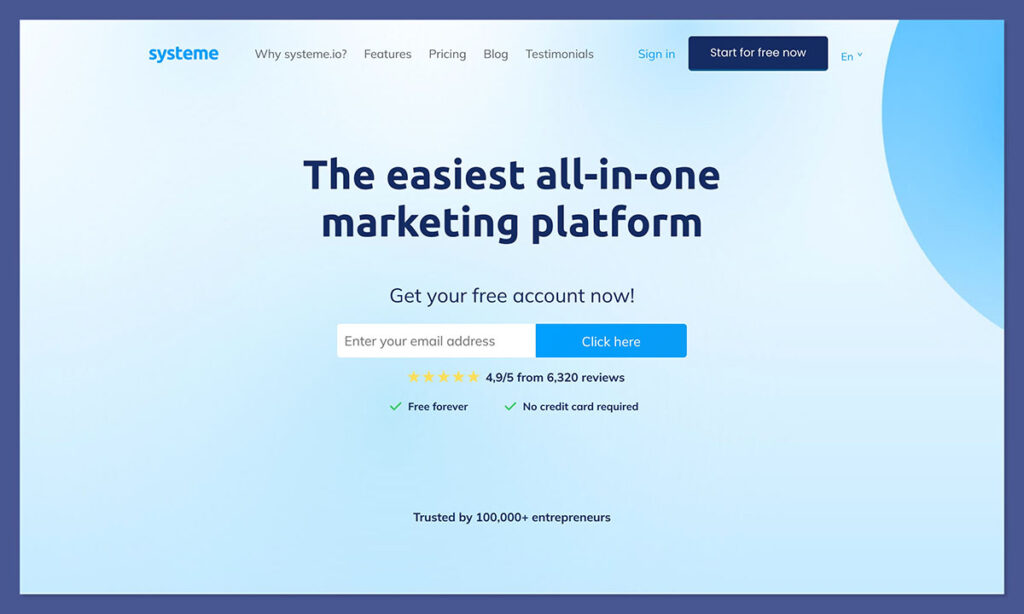
Systeme.io is a low-cost, all-in-one platform that lets you run funnels, email marketing, and sell online courses—all in one place. It’s the closest Kajabi alternative for people on a budget.
Systeme.io is a strong fit for entrepreneurs who want to launch quickly without juggling multiple tools. You can build sales funnels, automate email sequences, and deliver online courses all from a single dashboard.
While it may not offer the polished experience of higher-end platforms, its pricing and simplicity make it a solid choice for side hustlers, first-time creators, and anyone running a lean digital business.
Pricing
- Free Plan – $0/month
- Startup – $27/month
- Webinar – $47/month
- Unlimited – $97/month
Pros
- Run funnels, email lists, and courses in one place
- Free plan supports 3 sales funnels and 1 course
- Very low cost for what you get
- Great for digital product creators
- 0% transaction fees
Cons
- The UI feels a bit clunky
- Limited design flexibility
- Support is responsive but not instant
11. Mighty Networks
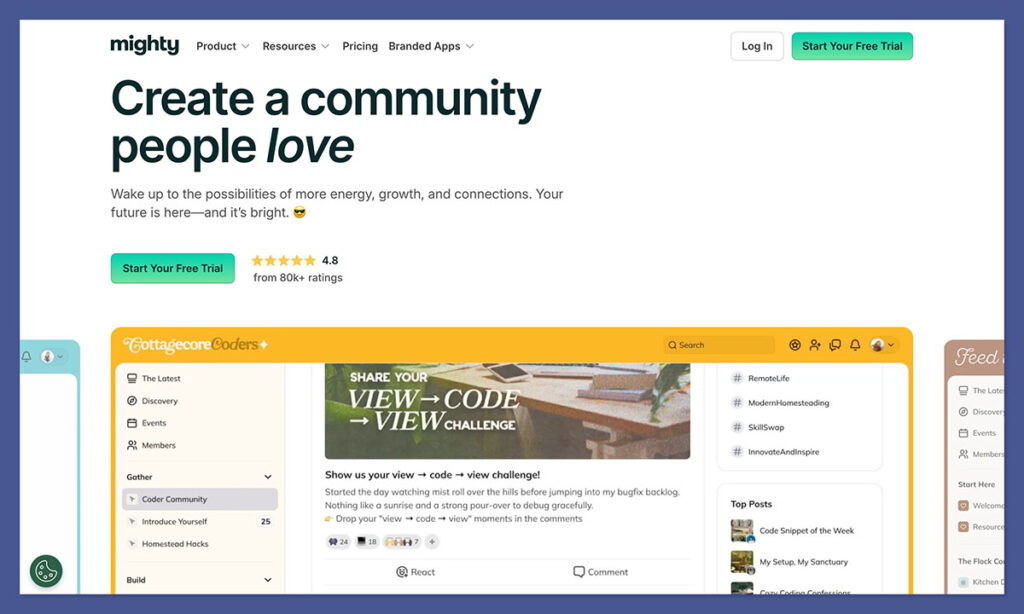
Mighty Networks is a community-first platform that also lets you sell courses. Perfect for creators who want to build their own private space – like a Facebook group but owned by you.
Mighty Networks is designed for creators who want to prioritize community engagement just as much as content delivery. It's particularly popular with coaches, thought leaders, and membership-based businesses that thrive on interaction.
If you're building a tribe around your brand, and want to create a sticky, recurring revenue experience, Mighty Networks provides a flexible and immersive platform for hosting discussions, live events, and online courses under one roof.
Pricing
- Community Plan – $39/month
- Business Plan – $119/month
- Courses Plan – $179/month
Pros
- Combines community + courses in one platform
- Great mobile app
- You own the customer relationship
- Built-in events, chat, and community spaces
Cons
- Less focused on standalone course sales
- Some limitations around page and course design
- Can get pricey if you're only using it for courses
12. Graphy (by Unacademy)
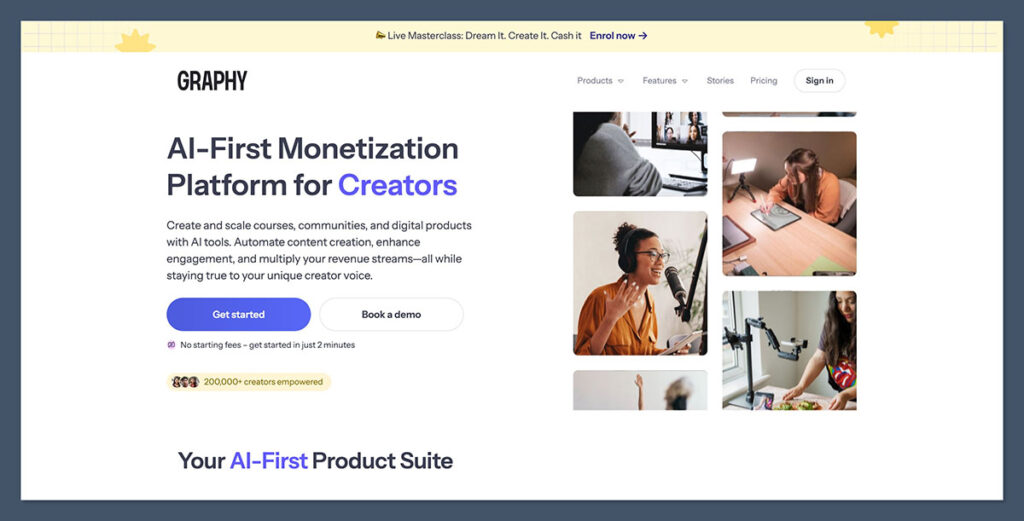
Graphy is built for creators who want mobile-first course experiences. It’s especially popular in India but is expanding globally. You get an app, a website, and tools to monetize via courses, memberships, and more.
Graphy is a great solution for creators targeting mobile-savvy audiences, especially in emerging markets. With features like live classes, app customization, WhatsApp integrations, and regional payment options, it’s designed to cater to local needs while maintaining a global approach.
It also supports multi-language content and allows creators to offer coaching, downloads, and digital products from one unified platform.
Pricing
- Starts at around $49/month
- Custom pricing for larger creators
Pros
- Mobile-first experience
- Built-in marketing tools
- App + website included
- Indian payment gateways + global support
- White-label options
Cons
- Less recognition outside of India (but growing)
- Not as feature-rich as Kajabi or LearnWorlds
👉 Read more: Teachable vs Graphy
Which of These Teachable Alternatives is the Best?
Each and every one of these solutions are viable Teachable alternatives. Your choice largely comes down to your budget and the number of features you want access to.
If you're struggling to make a decision, we encourage you to make the most of solutions that come with free trials. That way, you can get to grips with the software before parting with your precious cash.
Have you got any experience with the above Teachable alternatives? If so, we'd love to hear your thoughts and opinions in the comments box below!




Comments 0 Responses